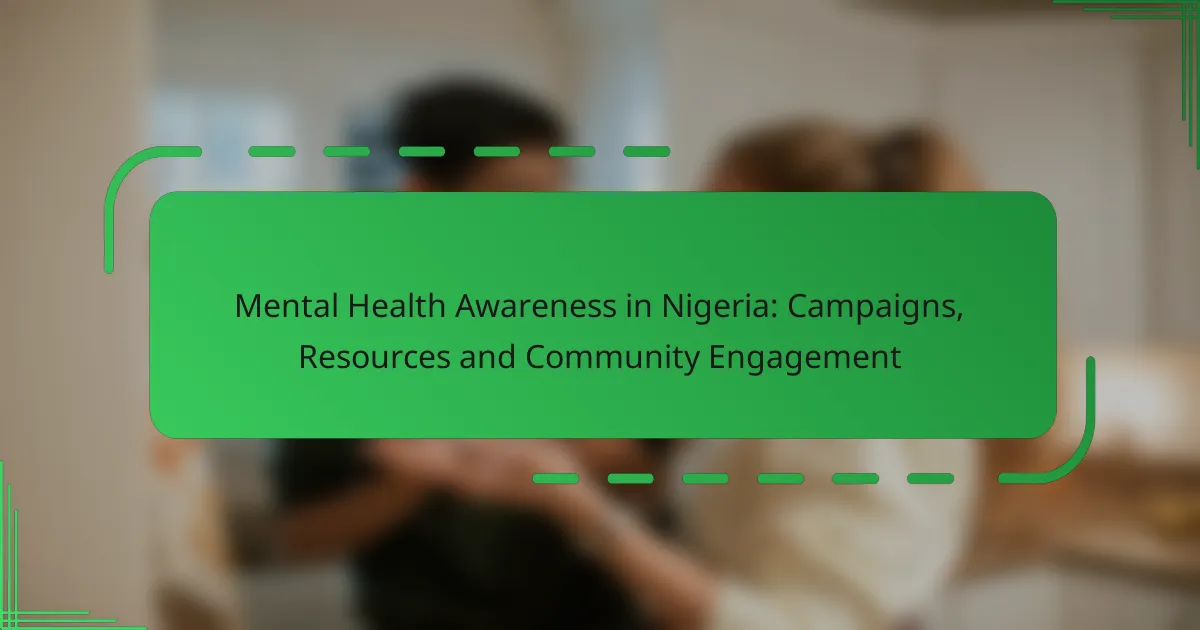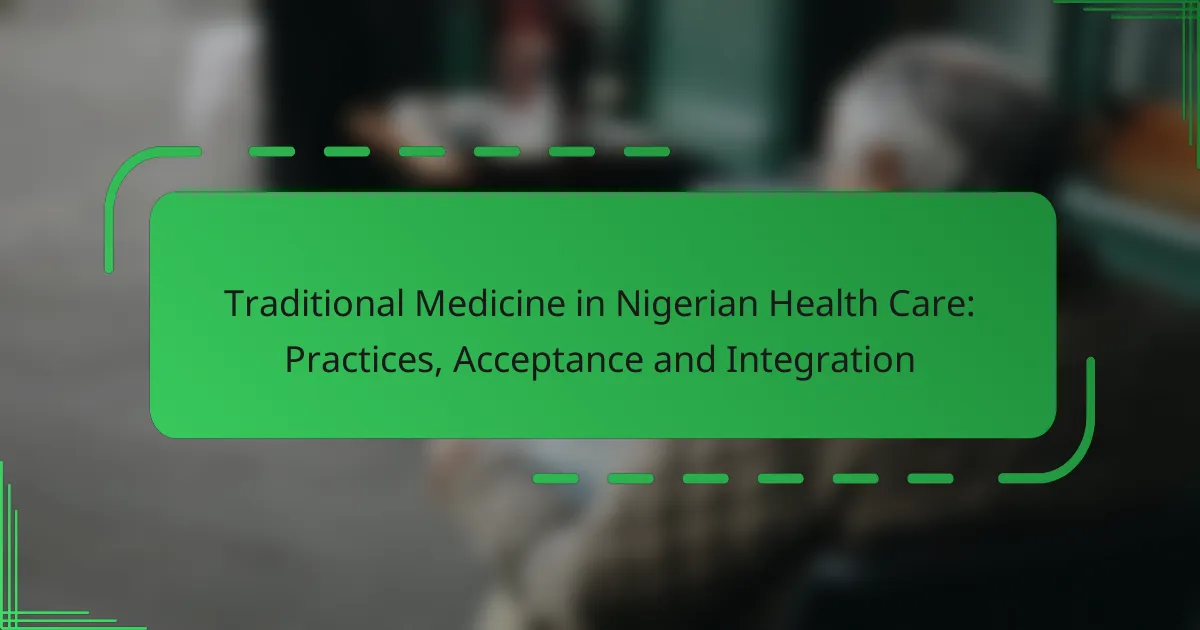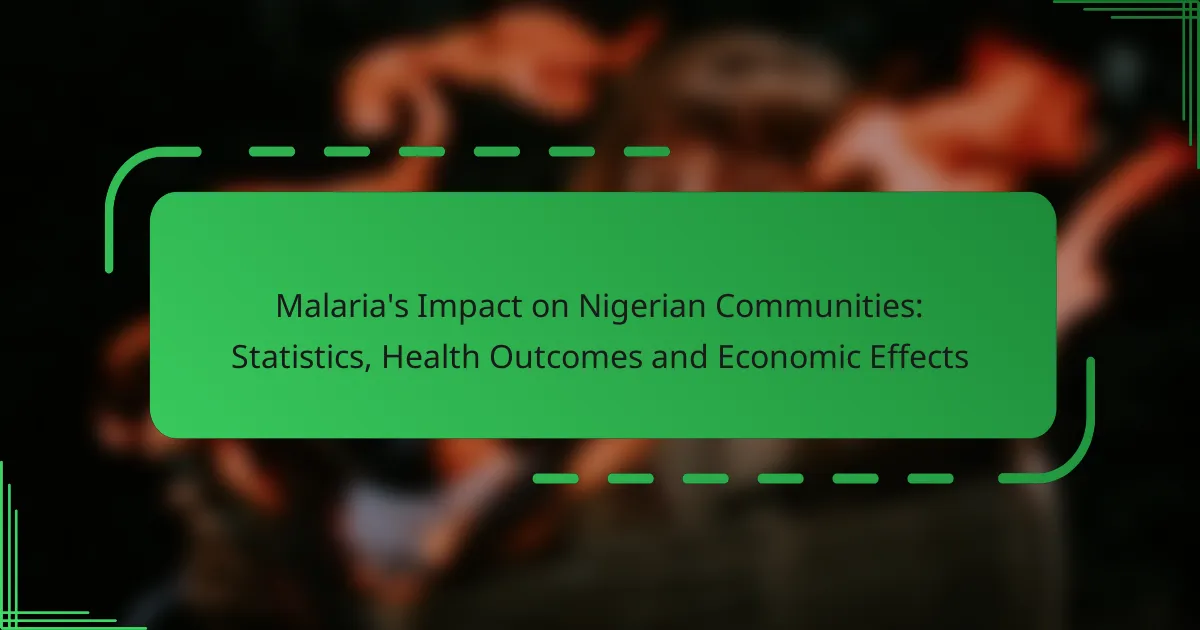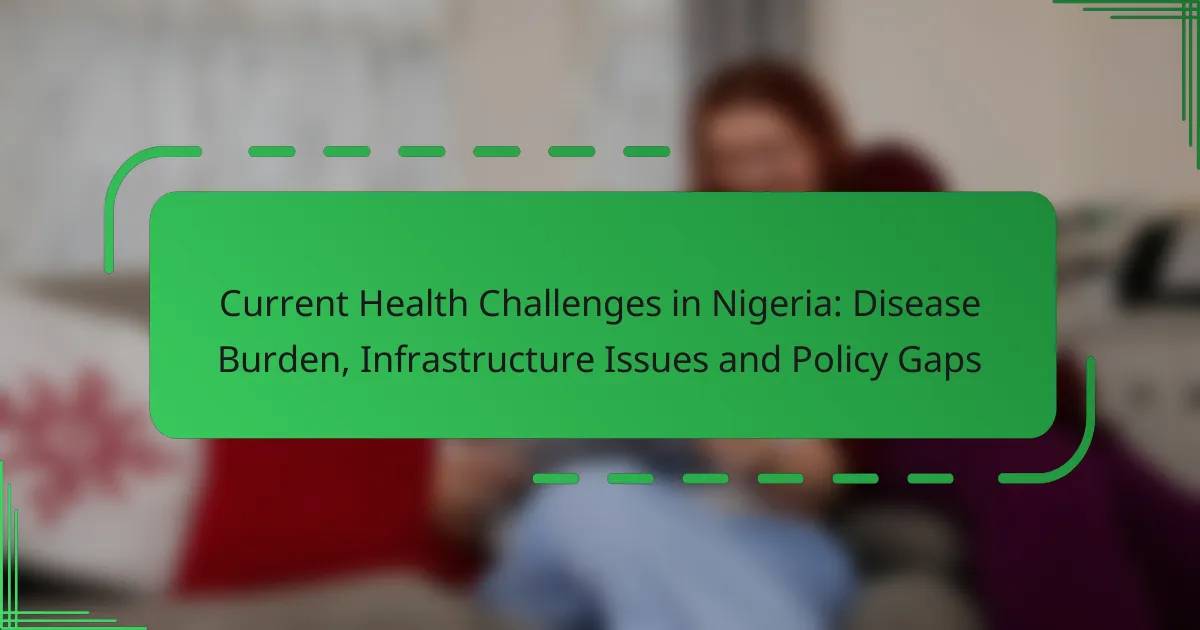Mental health awareness in Nigeria is crucial for educating the public, reducing stigma, and providing essential support resources. Through community engagement, workshops, and online platforms, these campaigns foster understanding and encourage open conversations about mental well-being. By participating in local initiatives, individuals can contribute to a more supportive environment for mental health issues across the nation.
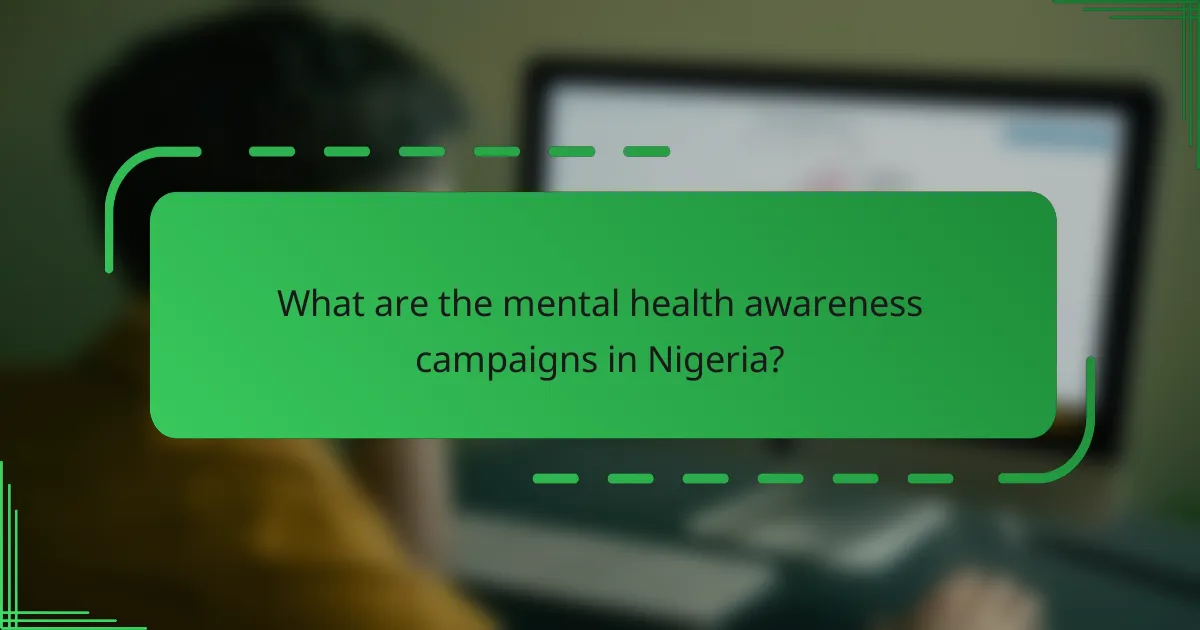
What are the mental health awareness campaigns in Nigeria?
Mental health awareness campaigns in Nigeria aim to educate the public about mental health issues, reduce stigma, and provide resources for support. These initiatives often involve community engagement, workshops, and online resources to promote mental well-being across various demographics.
Mentally Aware Nigeria Initiative
The Mentally Aware Nigeria Initiative (MANI) focuses on raising awareness about mental health through social media campaigns, workshops, and community outreach. They provide resources and support for individuals experiencing mental health challenges, emphasizing the importance of seeking help.
MANI also collaborates with mental health professionals to offer training sessions and seminars, helping to equip community members with knowledge and tools to address mental health issues effectively.
Suicide Prevention Nigeria
Suicide Prevention Nigeria is dedicated to reducing the incidence of suicide through awareness campaigns and support services. They provide a helpline for individuals in crisis, offering immediate assistance and guidance.
The organization conducts workshops and seminars aimed at educating the public about the warning signs of suicidal behavior and the importance of mental health support, fostering a culture of openness and understanding.
Mind Matters Nigeria
Mind Matters Nigeria focuses on promoting mental health education and advocacy through various platforms, including social media and community events. They aim to destigmatize mental health issues by sharing personal stories and experiences.
The initiative also offers resources for mental health professionals and individuals seeking help, creating a network of support that encourages open discussions about mental well-being.
Project Enable Africa
Project Enable Africa works to empower individuals with mental health challenges by providing access to resources and support systems. Their campaigns often highlight the importance of mental health in the context of disability rights and inclusion.
Through workshops and community engagement, Project Enable Africa advocates for policies that support mental health initiatives and improve access to care for marginalized populations.
Green October
Green October is an annual campaign aimed at raising awareness about mental health issues in Nigeria, particularly during the month of October. The campaign encourages individuals and organizations to participate in activities that promote mental health awareness.
Activities may include mental health screenings, community discussions, and fundraising events to support mental health organizations. The goal is to foster a supportive environment where individuals feel comfortable discussing their mental health challenges.
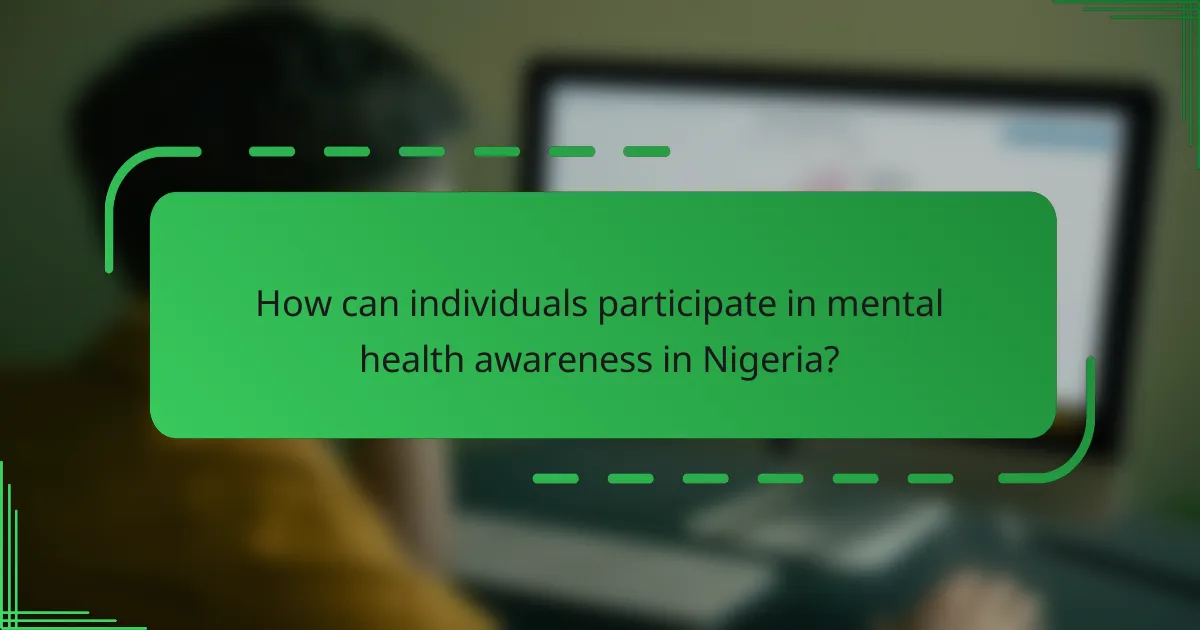
How can individuals participate in mental health awareness in Nigeria?
Individuals can engage in mental health awareness in Nigeria through various activities that promote understanding and support for mental health issues. By taking part in local initiatives, individuals can help reduce stigma and encourage open conversations about mental health.
Volunteer for local NGOs
Volunteering for local non-governmental organizations (NGOs) focused on mental health is a direct way to contribute. Many NGOs in Nigeria work on awareness campaigns, provide support services, and conduct educational programs. By offering your time, you can help facilitate these initiatives and reach more people.
Consider reaching out to organizations like the Mental Health Foundation Nigeria or the Nigerian Mental Health Coalition. They often have volunteer programs that welcome individuals with various skills, from counseling to event planning.
Join community workshops
Participating in community workshops can enhance your understanding of mental health issues and provide valuable resources. These workshops often cover topics such as stress management, coping strategies, and the importance of mental well-being. Engaging in these sessions can also foster a supportive community atmosphere.
Look for workshops organized by local health centers or community groups. Many are free or low-cost, making them accessible to a wide audience. Attending regularly can help you stay informed and connected.
Advocate on social media
Using social media platforms to advocate for mental health awareness is an effective way to reach a broader audience. Sharing informative content, personal stories, or resources can help demystify mental health issues and encourage others to seek help. Your voice can contribute to a larger movement for change.
Consider creating posts that highlight local mental health events or share statistics about mental health in Nigeria. Engaging with hashtags like #MentalHealthNigeria can also connect you with others who are passionate about this cause.
Participate in mental health walks
Joining mental health walks is a tangible way to show support and raise awareness in your community. These events often aim to promote mental health resources and reduce stigma surrounding mental illness. Participating can also foster a sense of solidarity among attendees.
Check local listings for upcoming mental health walks, which may be organized by NGOs or community health organizations. These events usually welcome participants of all ages and can be a fun way to engage with others while advocating for mental health awareness.
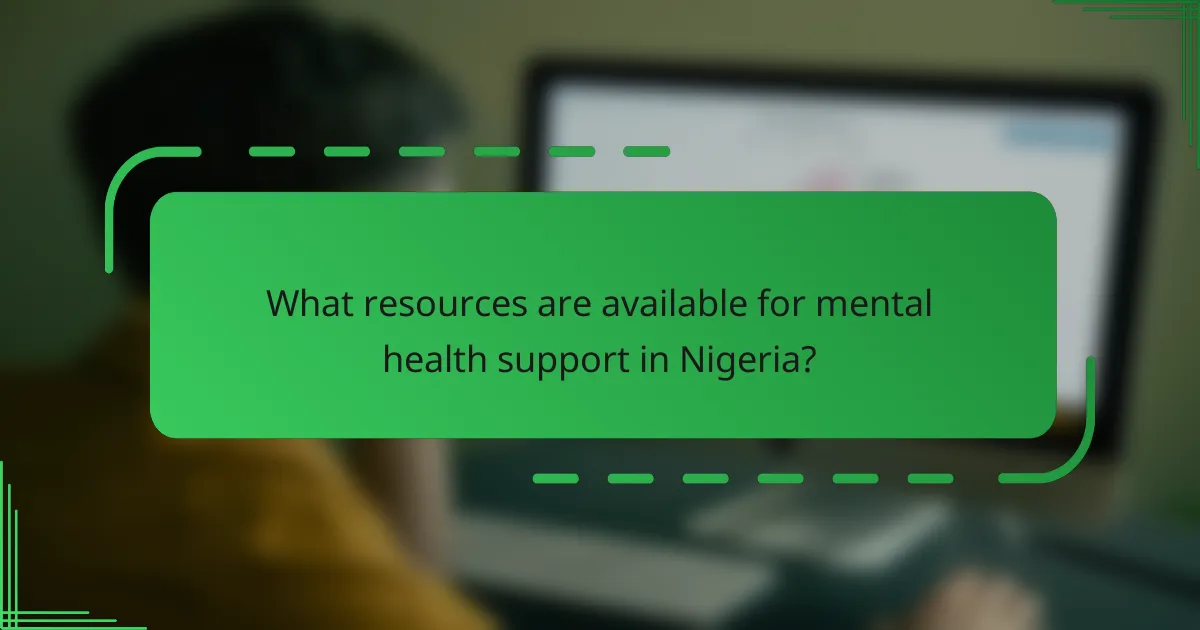
What resources are available for mental health support in Nigeria?
Nigeria offers various resources for mental health support, including policies, helplines, online platforms, and community centers. These resources aim to improve access to mental health care and raise awareness about mental health issues across the country.
Nigerian Mental Health Policy
The Nigerian Mental Health Policy provides a framework for mental health services and aims to promote mental well-being. It emphasizes the need for integration of mental health into primary health care and encourages community-based services.
Key components of the policy include the establishment of mental health facilities, training for health care providers, and public awareness campaigns. These initiatives are designed to reduce stigma and improve access to care for individuals with mental health conditions.
Helplines and support services
Several helplines and support services are available for individuals seeking immediate mental health assistance in Nigeria. These services often provide confidential support and guidance from trained professionals.
Examples include the Mental Health Helpline, which offers 24/7 support, and various NGOs that provide counseling services. It is advisable to keep contact information for these helplines readily available for quick access during crises.
Online therapy platforms
Online therapy platforms have gained popularity in Nigeria, providing accessible mental health support through virtual consultations. These platforms connect users with licensed therapists via video calls, chats, or messaging.
Some notable platforms include TherapyRoute and Talkspace, which offer flexible scheduling and a range of therapy options. Users should consider their needs and preferences when selecting a platform, as costs can vary significantly.
Community mental health centers
Community mental health centers play a crucial role in providing localized support and treatment for mental health issues. These centers often offer a range of services, including counseling, rehabilitation, and educational programs.
In Nigeria, many of these centers are funded by government initiatives or NGOs and aim to serve underserved populations. Engaging with local community centers can provide individuals with tailored support and foster a sense of belonging.
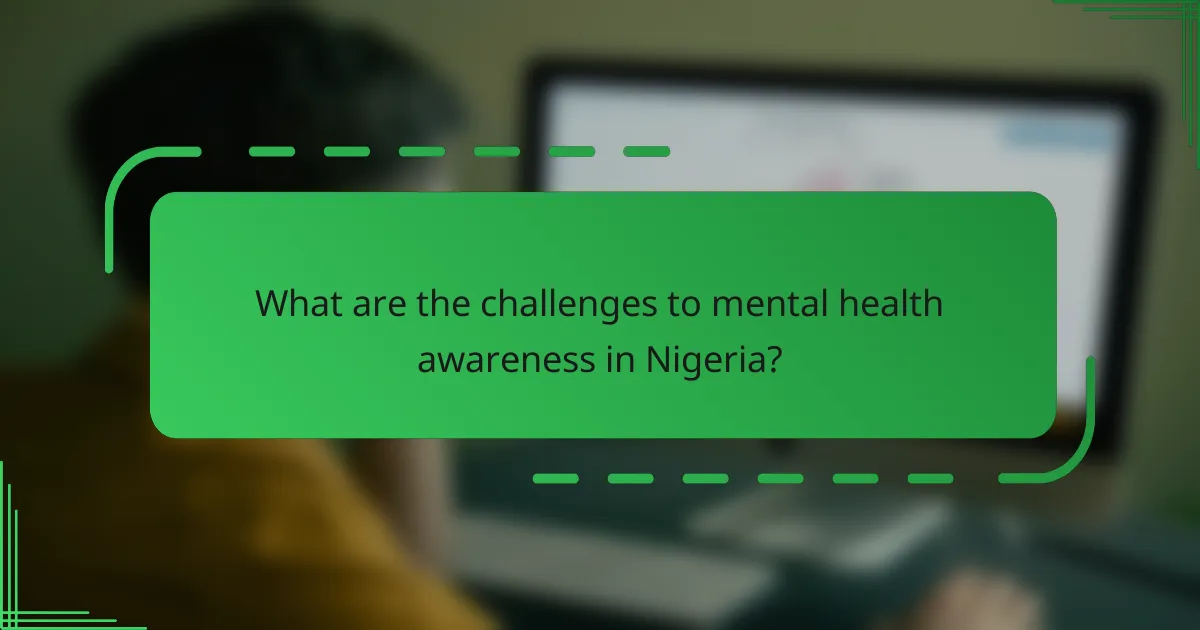
What are the challenges to mental health awareness in Nigeria?
The challenges to mental health awareness in Nigeria include stigma, insufficient funding for services, and limited access to professionals. These factors hinder effective communication and support for mental health issues across the country.
Stigma surrounding mental illness
Stigma is a significant barrier to mental health awareness in Nigeria, often leading to discrimination against individuals with mental health conditions. Many people view mental illness as a sign of weakness or a personal failing, which discourages open discussions and seeking help.
To combat stigma, community education and awareness campaigns are essential. These initiatives can help reshape perceptions and encourage individuals to share their experiences without fear of judgment.
Lack of funding for mental health services
Funding for mental health services in Nigeria is often inadequate, resulting in limited resources for treatment and support. Government budgets typically allocate a small percentage to mental health, which affects the availability of facilities and trained personnel.
Advocating for increased funding is crucial. Stakeholders can engage with policymakers to emphasize the importance of mental health and the need for budgetary allocations that reflect the population’s needs.
Limited access to mental health professionals
Access to mental health professionals in Nigeria is severely limited, particularly in rural areas where healthcare infrastructure is weak. Many regions lack qualified psychiatrists, psychologists, and counselors, making it difficult for individuals to receive necessary care.
To improve access, telehealth services can be a viable solution, allowing individuals to connect with professionals remotely. Additionally, training community health workers in basic mental health support can help bridge the gap in care.
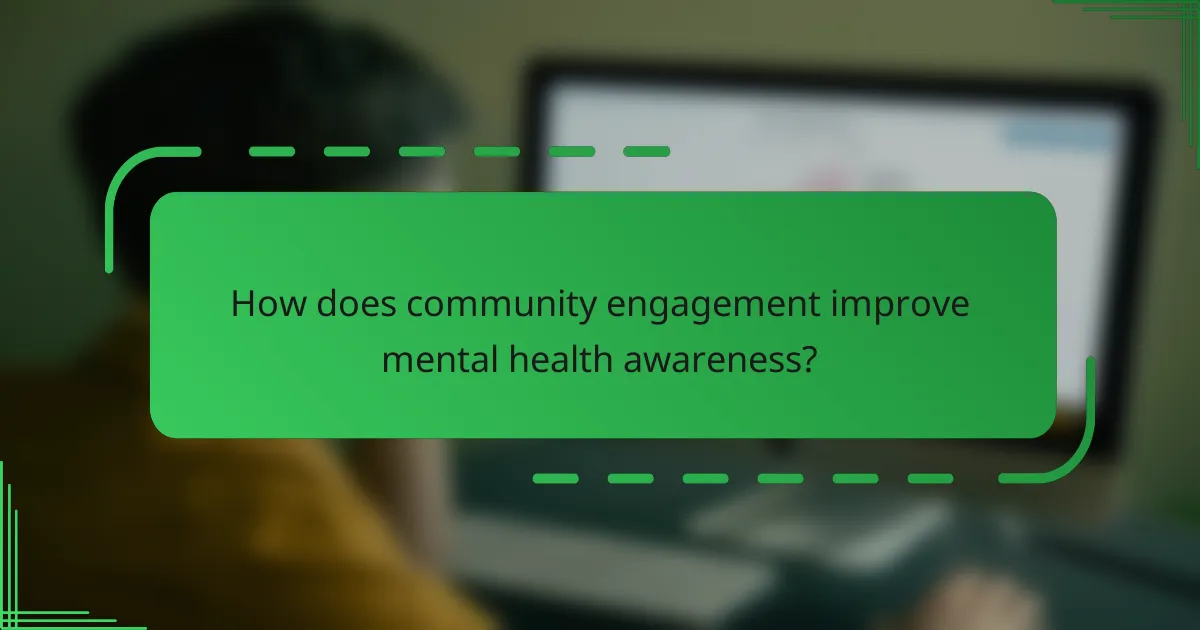
How does community engagement improve mental health awareness?
Community engagement enhances mental health awareness by fostering connections and support among individuals. It creates an environment where people can share experiences, access resources, and reduce stigma associated with mental health issues.
Building supportive networks
Supportive networks are crucial for improving mental health awareness as they provide individuals with a sense of belonging and understanding. These networks can include family, friends, local organizations, and mental health professionals who work together to promote mental well-being.
To build effective supportive networks, consider organizing community events such as workshops, seminars, or support groups focused on mental health topics. These gatherings can facilitate open discussions, share valuable resources, and connect individuals who may be facing similar challenges.
Additionally, leveraging social media platforms can help expand these networks. Online groups and forums dedicated to mental health can provide a safe space for individuals to seek advice, share their stories, and find encouragement from others in their community.
